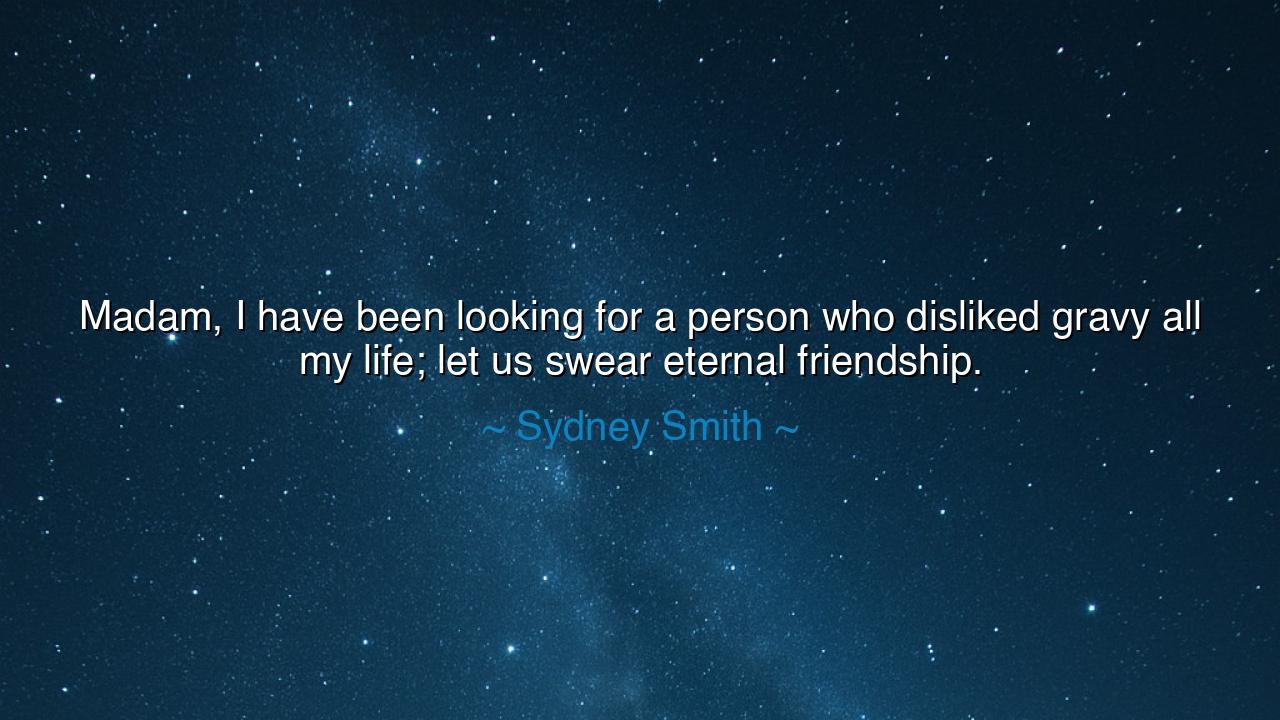
Madam, I have been looking for a person who disliked gravy all my
Madam, I have been looking for a person who disliked gravy all my life; let us swear eternal friendship.






In the humorous yet profound words of Sydney Smith, the English clergyman and wit of the nineteenth century, we find an unlikely revelation: “Madam, I have been looking for a person who disliked gravy all my life; let us swear eternal friendship.” At first glance, it seems but a jest — a light remark tossed across a dinner table. Yet beneath its laughter lies a deep and enduring truth: that friendship is often born not from grand philosophies or solemn vows, but from the sudden recognition of kindred spirit — that rare and joyful moment when one soul looks upon another and says, “Ah, you too.”
Smith, known for his wit and his warmth, lived in an age where intellect and humor walked hand in hand. His words reveal the spirit of one who understood that the greatest bonds between people do not depend on perfection or solemnity, but on shared delight, shared difference, and the small, sacred quirks that set us apart from the crowd. To say, “You dislike gravy as I do,” is to say, “You understand me in this peculiar, personal way.” It is a celebration of recognition, the instant spark that kindles the eternal flame of friendship. For though many may share our beliefs, only a few share our strangeness — and those few become our truest companions.
The ancients, too, understood this mystery of human connection. The philosopher Cicero, in his treatise De Amicitia, declared that friendship is born when one soul recognizes virtue in another, and a harmony of values binds them. Yet Smith’s humor refines this noble vision into something more human and tender. He reminds us that friendship is not always born from lofty ideals, but often from the small, joyous accidents of daily life — a shared taste, a shared jest, a shared rebellion against the ordinary. The dislike of gravy, absurd though it may seem, becomes a symbol of shared individuality — the meeting of two spirits who stand apart from the multitude, laughing together in the knowledge of their own peculiar truth.
Consider the story of J.R.R. Tolkien and C.S. Lewis, two great writers who met not through formal alliance, but through spirited disagreement and conversation. It was in the smoke-filled rooms of Oxford, amidst debates about myth, faith, and the imagination, that they discovered in one another that rare companionship of minds. Their friendship, like Sydney Smith’s quip, began not in solemnity but in recognition — a shared defiance of the dullness of modernity, a shared reverence for the ancient and the divine. Through laughter, debate, and inspiration, they swore, in their own way, an “eternal friendship,” and from that bond came stories that shaped the dreams of generations.
The quote, then, though wrapped in jest, is no mere comedy. It is a hymn to the rare meeting of souls. In a world vast and crowded, how precious it is to find one who mirrors your oddities, who understands your silences, who laughs at your jokes not because they are funny, but because they are yours. To find such a person is to find a harbor in life’s storm — a place where you can be wholly yourself without disguise. Smith’s “gravy” is every trivial thing that, in truth, is not trivial at all — it is the thread that connects hearts through shared imperfection.
In his laughter, Smith teaches a lesson the solemn often forget: that joy is the root of friendship, not duty alone. True friends are not bound merely by virtue or necessity, but by the music of shared laughter and the grace of mutual understanding. Friendship must be light enough to fly through time, not heavy with expectation. To laugh together is to affirm life; to share an oddity is to say, “You and I see the world a little differently, but we see it together.”
So take this teaching to heart, O listener: seek not perfection in your friends, but kindred imperfection. Celebrate the small things — the shared taste, the mutual disdain, the inside joke that no one else would understand. Do not measure friendship by solemn words or length of acquaintance, but by the ease of laughter, the peace of presence, the joy of recognition. When you find one whose quirks echo your own, hold them close; they are your mirror in this vast and lonely world.
And remember this final truth — that even in jest, the heart speaks its deepest longing. For when Sydney Smith said, “Let us swear eternal friendship,” he spoke for all who have ever looked across the table, seen themselves reflected in another’s smile, and known in that moment that life, for all its gravity, is worth living — if only for the joy of such companionship.






AAdministratorAdministrator
Welcome, honored guests. Please leave a comment, we will respond soon